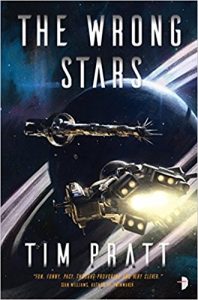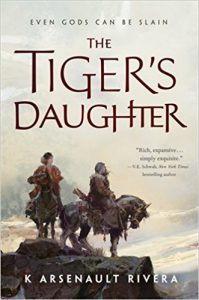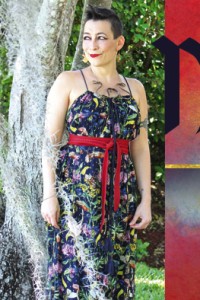2017 in Review by Liz Bourke
 [Editor’s note: part of our 2017 year-in-review essay series from the February 2018 issue of Locus]
[Editor’s note: part of our 2017 year-in-review essay series from the February 2018 issue of Locus]
How do you sum up a year like 2017? It feels like it was a longer year than usual – and as I write this, it isn’t even over yet.
I don’t like writing about my favourite books, even my favourite books in any given year. At the time of writing, I’ve read 209 books this year, between novels, standalone novellas, and nonfiction. A good proportion of those were published this year, so there’s a lot of books to choose from – and my favourites are likely to change by the day. Every book does something different, satisfies (or fails to satisfy) a different need, and whether or not I approve of its success depends on my mood. An essay at the end of the year cries out for me to impose a narrative upon my fickle humours and make some hard choices.
2017 was, it must be said, a banner year for books that touched my heart as a queer woman. Books that made me sit up and say Holy shit, you can DO that now? Books that really worked. This year, more than any previous year, the emergent theme – for me, at least – has been queerness: the prominence of queer characters and queer relationships in fiction who don’t end up with tragic endings. That’s not to say that every book I loved from 2017 featured prominent queer characters or relationships, but certainly a plurality of them did.
I’m going to un-scientifically divide my favourites into “science fiction” and “fantasy.” Science fiction can go first, because Alex Wells’ Hunger Makes the Wolf kicked the year off in explosive fashion. Set on Tanegawa’s World, a planet controlled by the corporation that holds a monopoly on interstellar travel, it’s a fast, fun, enormously compelling science fiction novel in the “space western planetary opera” mode. Modern technology doesn’t work as well on Tanegawa’s World as it does elsewhere, resulting in a world where communication is difficult, and travel across the desert takes place by train or by motorbike. Miners work with old-fashioned equipment (and few labour protections) to produce the minerals that the Company relies on, and outbreaks of “witchiness” are viciously suppressed. The heart of this novel is a friendship between two young women: one a witchy mercenary, with unusual powers, and the other a labour organiser, working for miners’ rights. It’s a really good debut novel.
Another really good debut novel on the science fiction side of the aisle is R.E. Stearns’ Barbary Station. Published by Saga Press, it stars two engineers, who, discouraged by the wage-slavery economic situation awaiting them on graduation and not wanting to be parted (because they’re in a strong, stable, loving relationship), set out to join an infamous group of space pirates, who base themselves on the abandoned Barbary Station in the outer reaches of the solar system. With the pirates, they have a chance at a life together in some measure of comfort – and the pirates haven’t been known to kill very many people. Unfortunately for them, the pirates aren’t living in comfortable luxury: they’re clinging to the outside of Barbary Station, trapped by the station’s murderous AI, with no way to escape. But with two highly trained engineers, one of whom’s an AI engineering specialist, they have a chance.
Barbary Station takes its time to get going, but once it gets rolling, it’s well worth it. With a romantic relationship of longstanding – one that’s just there, not a cause for Romantic Tension, but one which informs both of our main characters’ actions – pirates, lesbian engineers, and murderous AI, it has all the ingredients of a really great novel, and it employs them really well.
Tim Pratt’s The Wrong Stars is another space opera, completely different to Barbary Station – except that it, too, takes place in the outer reaches of the solar system, and stars protagonists who are queer women. It’s a fast novel, punchy, pulpy, and delightfully fun. It’s entirely a breath of fresh air.
If I take a look over at the fantasy side of my (largely arbitrary) dividing line, I have even more favourites from the year. A simple list would take up quite some space: starting with Foz Meadows’ A Tyranny of Queens, sequel to her amazing portal fantasy An Accident of Stars; and going on to include Ruthanna Emrys’s astounding debut Winter Tides, a vivid and affecting reimagination of the Lovecraft mythos that deals with genocide – both cultural and otherwise – memory, and family; Max Gladstone’s utterly amazing latest Craft novel, Ruin of Angels, which is complex and thinky and fast and fraught and just so damn good; Fran Wilde’s Horizon, capstone to a trilogy about flight and belonging; Aliette de Bodard’s utterly amazing The House of Binding Thorns, which defies my ability to easily encompass in words.
 There are two epic fantasy standouts for me from 2017. Elizabeth Bear’s gloriously epic The Stone in the Skull, set in the same world as her gorgeous Eternal Sky trilogy, takes the best elements of sword-and-sorcery and marries them to the best of the epic fantasy tradition. Two wandering adventurers – one with an ongoing case of PTSD, one with a body that is basically all prosthesis – are carrying a message from a wizard to a young queen surrounded by enemies. Magic, dragons, elephants, poetesses, and Bear’s precisely eloquent prose building towards an epic arc: it’s brilliant, and I love it.
There are two epic fantasy standouts for me from 2017. Elizabeth Bear’s gloriously epic The Stone in the Skull, set in the same world as her gorgeous Eternal Sky trilogy, takes the best elements of sword-and-sorcery and marries them to the best of the epic fantasy tradition. Two wandering adventurers – one with an ongoing case of PTSD, one with a body that is basically all prosthesis – are carrying a message from a wizard to a young queen surrounded by enemies. Magic, dragons, elephants, poetesses, and Bear’s precisely eloquent prose building towards an epic arc: it’s brilliant, and I love it.
The second epic fantasy standout is a debut novel. K. Arsenault Rivera’s The Tiger’s Daughter is a fantasy novel that sets itself in a milieu strongly influenced by Central Asia and the relationship of steppe peoples with China, but reaches for a mythic register with the inclusion of demons, a Wall of Flowers which is supposed to hold back a terrible threat, and two young women who may or may not have powers like gods. It’s also an epic romance – like many epic romances, it seems perhaps not entirely healthy for its participants.
It’s epistolary in style, told in the form of one very long letter from one woman to another, as a record of their lives together from early childhood, through to a crisis that separated them. The intimacy of the first and second person narrative is beguiling and compelling, and seriously, the way in which this book is full of awesome women is a delight. It’s an ambitious first novel, and mostly successful. And I’m really looking forward to the sequel.
There are other books I could tell you about – April Daniels’ superhero story in Dreadnought, and the glory of Ursula Vernon’s The Clockwork Boys; Fonda Lee’s complex and intricate Jade City, the genre-crossing The Prey of Gods by Nicky Drayden – not a favourite, but I remain fascinated by the ambition of it – and Nnedi Okorafor’s Binti: Home. But if I don’t force myself to stop somewhere, I might just keep going forever. There were a lot of really good books in 2017, books that I enjoyed, books that spoke to me. I’m hoping that 2018 can continue to be pleasing in this very same fashion.
Liz Bourke is a cranky queer person who reads books. She holds a Ph.D in Classics from Trinity College, Dublin. Her first book, Sleeping With Monsters, a collection of reviews and criticism, is out now from Aqueduct Press. Find her at her blog, her Patreon, or Twitter. She supports the work of the Irish Refugee Council and the Abortion Rights Campaign.
This article and more like it in the February 2018 issue of Locus.







